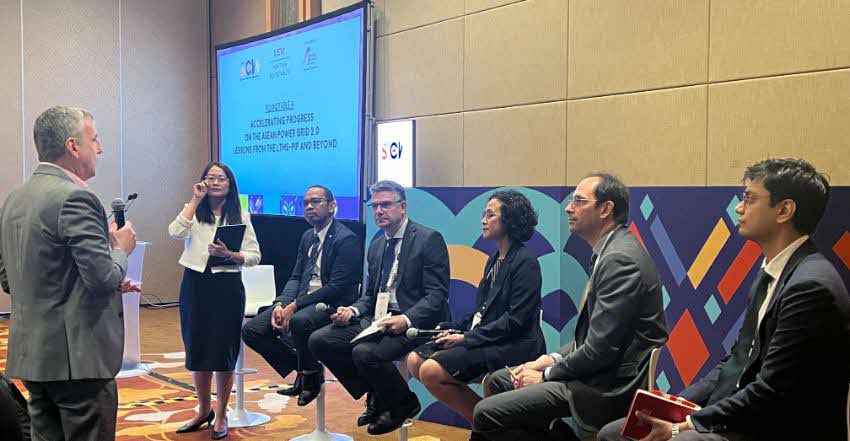Insights gleaned from the project one year on, and the path forward for the ASEAN Power Grid 2.0.

As the Lao PDR-Thailand-Malaysia-Singapore Power Integration Project (LTMS-PIP) marked its one-year anniversary in June 2023, this momentous milestone demonstrated the feasibility of importing 100 megawatts of hydropower from Lao PDR to Singapore through a transnational network spanning Thailand and Malaysia.
In the region's first bold steps towards an interconnected future, this roundtable delved into the valuable lessons drawn from the LTMS-PIP experience. Panellists discussed the opportunities and challenges that lie ahead for the ASEAN Power Grid, while charting a course for energy stakeholders in the ever-evolving energy landscape.
Dr Mirza Huda, Lead Researcher at ISEAS – Yusof Ishak Institute, commenced his presentation by highlighting the significant strides made in the ASEAN Power Grid. This initiative is expected to result in a substantial savings of about US$1.8 billion while fostering greater adoption of renewable energy sources across the region.
Reflecting on the triumphs of the LTMS-PIP, he emphasised that tackling challenges in multilateral power trades requires political will, market reform, and considerations regarding charge methodologies. He also pointed out the pressing need for investments to address ageing infrastructure, with over US$2 billion required.
Matthew Wittenstein, Chief of Section, Energy Connectivity, United Nations Economic and Social Commission for Asia and the Pacific (ESCAP), continued the session, sharing insights from cross-border energy connectivity initiatives in Asia Pacific. He highlighted the transformative potential of power system connectivity, including cost reduction, enhanced energy security, and the facilitation of decarbonisation.
Mr Wittenstein also stressed the importance of creating larger and more integrated power systems across the region to effectively achieve these goals. He highlighted the role of multilateral power trade as a crucial tool for decarbonisation.
The session concluded with a panel session featuring energy leaders from intergovernmental organisations and the private sector. They addressed issues such as overcoming regional interconnectivity the bottlenecks, the need for greater political will, risk considerations in the bankability of regional interconnectivity projects, and the integration of different renewable energy sources across borders.
Ultimately, while significant progress has been made, challenges persist on the path to net zero. Recommendations from the roundtable panellists ranged from increased investments to clear plans of action, and regional interconnectivity that mutually benefits all countries.
That said, the message was clear—that as we work towards a more integrated power market and the goal of reaching net zero emissions, the LTMS-PIP's one-year milestone serves as a testament to the potential and possibilities that lie ahead for the region.
Follow us on X (formerly Twitter) and Telegram to get the latest updates.